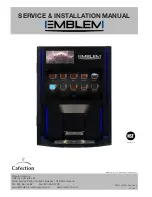
5–73
1
2
3
4
5
6
ït
çi
G3 FACSIMILE COMMUNICATIONS
5.6
V.34 MODEM Technology
The image transmission time is reduced drastically compared with the pre-
vious models by the V.34 modem (maximum transmission speed 33600
bps) recommended by
ITU-T
.
5.6.1 V.8/V.34 protocol
(1) Outline
• The V.8 protocol is used as the startup protocol to move to V.34. The
V.8 protocol enables connection with fax machines, data modem and
equipment using existing V-series modems. The V.34 modem con-
tains a modem circuit based on the previous recommendation to con-
nect with the previous modems and has upper compatibility.
• The actual data transmission speed is improved entirely on average by
speeding the modulation scheme and utilizing new techniques, such as
the pre-emphasis technique
*1
for increasing the S/N (signal-to-noise)
ratio and the probing technique
*2
for measuring line characteristics
and optimizing the modem operation according to the line condition.
• The V.8 protocol, V.34 pre-protocol and post-protocol use full-duplex
transmission to speed the processing.
• Fourteen image transmission speeds
*3
are available:
33600, 31200, 28800, 26400, 24000, 21600, 19200, 16800, 14400,
12000, 9600, 7200, 4800, and 2400 bps
• The modulation speed (baud rate)
*4
can be selected from among 2400,
3000, and 3200 symbols/sec (required) or 2743, 2800, and 3429 sym-
bols/sec (option). The data transmission speed can be set more finely
than the previous modems.
*1 The output level of a high-frequency zone with comparatively high
noise is raised, and then the transmission signal is sent.
*2 A tone signal known as a probing signal (L1 and L2) is output, and the
receiving side measures the characteristics of the line.
*3 The data signaling rate is recorded in the ITU-T standards manual.
Image transmission speed means the same as data signaling rate.
*4 The symbol rate is recorded in the ITU-T standards manual. Symbol
rate means the same as moderation speed and baud rate.
2743 symbol/sec cannot be used with this fax.
















































